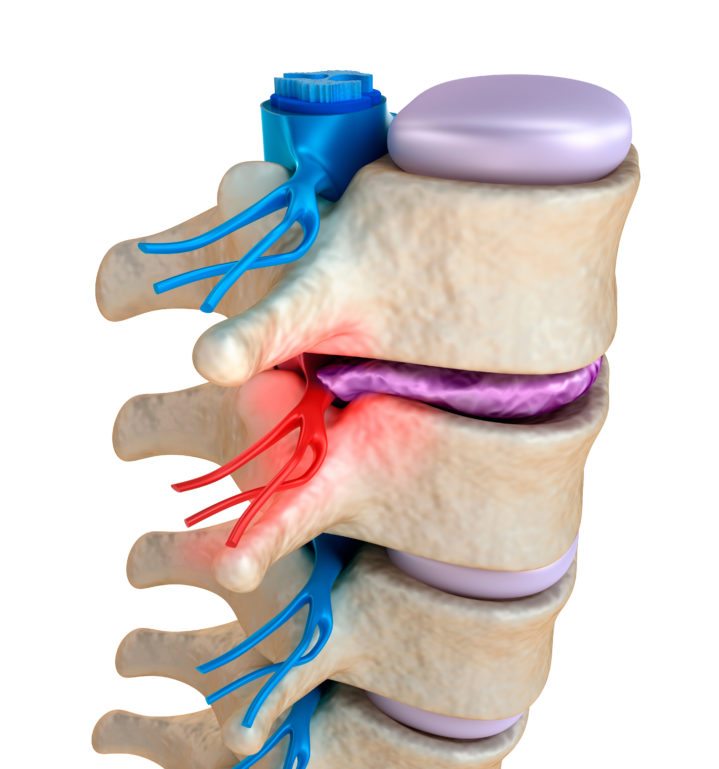What is a Pinched Nerve?
A pinched nerve results when pressure, inflammation, swelling, or other damage occurs to a peripheral nerve in the body. Peripheral nerves are located outside of the spinal cord and brain. Pinched nerves can occur anywhere in the body, although they are most commonly associated with back and neck pain injuries.

Uncomfortable sensations in any part of the body could be the result of a pinched nerve. It’s a common condition that will affect most people at some time in their lives. To diagnose if you have a pinched nerve, it’s important to understand the symptoms, causes, risks, and how it is diagnosed. Treatments range depending on the area and severity of the issue.
Signs and Symptoms
Numbness, pain, tingling, or other uncomfortable sensations may signal a pinched nerve. Peripheral nerves are found in all parts of the body, and they are not limited to the back or neck. Lower back, hips, legs, arms, hands, and feet can have pinched nerves. Sensations might feel like an electrical jolt or may present a burning sensation. They may stay in one general area, or they may travel from the neck down the arms, from the lower back through the legs, and in other regions. The symptoms may remain constant, or they may come and go, depending on the constancy of the pressure placed on the nerve. Changing positions and physical activity may bring relief or make the condition worse. This is why a diagnosis by a skilled health professional is recommended when the symptoms persist. The condition is highly treatable under most circumstances.
Diagnosis
Your doctor will ask a series of questions including onset, the frequency of the sensations, location, and any activities that you were doing before the start of the symptoms. A physical examination is conducted, and if deemed necessary, further testing may be done. The most common tests are X-rays to find out if there are any misalignments of the spinal vertebrae. If the condition is severe, further testing including CAT scans or EMG (electromyography) nerve conduction studies is used to assess the health of nerve tissue. In many cases, a simple exam is all that is needed to diagnose a pinched nerve. It is important to see your doctor when symptoms continue because a pinched nerve can lead to further tissue damage and over time, more severe complications can develop.
Causes
There are several potential causes for a pinched nerve. Assuming certain body positions such as crossing legs, leaning on elbows, poor posture, or awkward positioning of the neck for extended periods can lead to a pinched nerve. Spinal misalignment, bulging or herniated discs, obesity, over-exercising, accidental injury, and pregnancy are all risk factors for the development of a pinched nerve. Anything that causes pressure on peripheral nerves has the potential to cause damage over time.
Treatment for a Pinched Nerve
The recommended treatment will depend on the nature and extent of the problem. In some cases, a few days’ rest is all that is needed. If the physician determines that a particular activity is the cause, such as leg crossing or poor posture, changing habits for body positioning is essential in relieving the pressure. Pain and discomfort may be reduced for minor cases through the use of over-the-counter anti-inflammatory medications such as Naproxen or Ibuprofen.
Extreme conditions may call for additional treatment options. Arthritis or other joint conditions that are advanced because pinched nerves are routinely treated with corticosteroid injections to help reduce swelling and relieve nerve pressure.
Pinched nerves due to the additional weight of pregnancy are usually treated with anti-inflammatory medications and body re-positioning. The problem goes away after the child is born. Obesity and water retention resulting in pinched nerves are treated with a weight reduction plan usually combined with exercise and if required physical therapy. Over-the-counter, anti-inflammatory medications are satisfactory for controlling discomfort unless nerve damage has occurred.
Carpal tunnel is also a cause of pinched nerves with a broad range of recommended treatments. Wrist bracing or splinting may resolve the problem. In more extreme cases, surgery may be required to relieve pressure on the peripheral nerves. Physical therapy may also be recommended.
Surgery
Surgery can be the last option in most extreme cases. The surgeries themselves may involve procedures that remove herniated or bulging discs, inflamed tissue, bone, or anything that is applying pressure on a nerve root.
Some procedures may include:
- Laminectomy: This procedure allows a surgeon to remove a part of a vertebrae to make room for a pinched nerve. This procedure is the most common type of surgery.
- Foraminotomy: In which a surgeon can widen a vertebra where the nerves exit.
- Discectomy: A procedure where a surgeon removes or reduces a herniated or bulging disc that is irritating a spinal nerve.
- Facet Thermal Ablation can be used to deaden a nerve ending, but this will remove the ability of the body to detect pain or feeling in that nerve region.
Final Thoughts
Having a pinched nerve is something that most of us will experience at some point in our lives. While some cases are minor and easy to remedy, others may be more complicated. If the sensations are mild and go away completely after a few days, the issue has likely resolved itself. It is when the symptoms are severe or persist that you should seek medical attention. Not all cases require a physician’s treatment, but for those who do, it is important to get an accurate diagnosis and the best type of therapy. It is easier to prevent further damage to delicate nerve tissue by addressing the problem sooner, rather than later.
